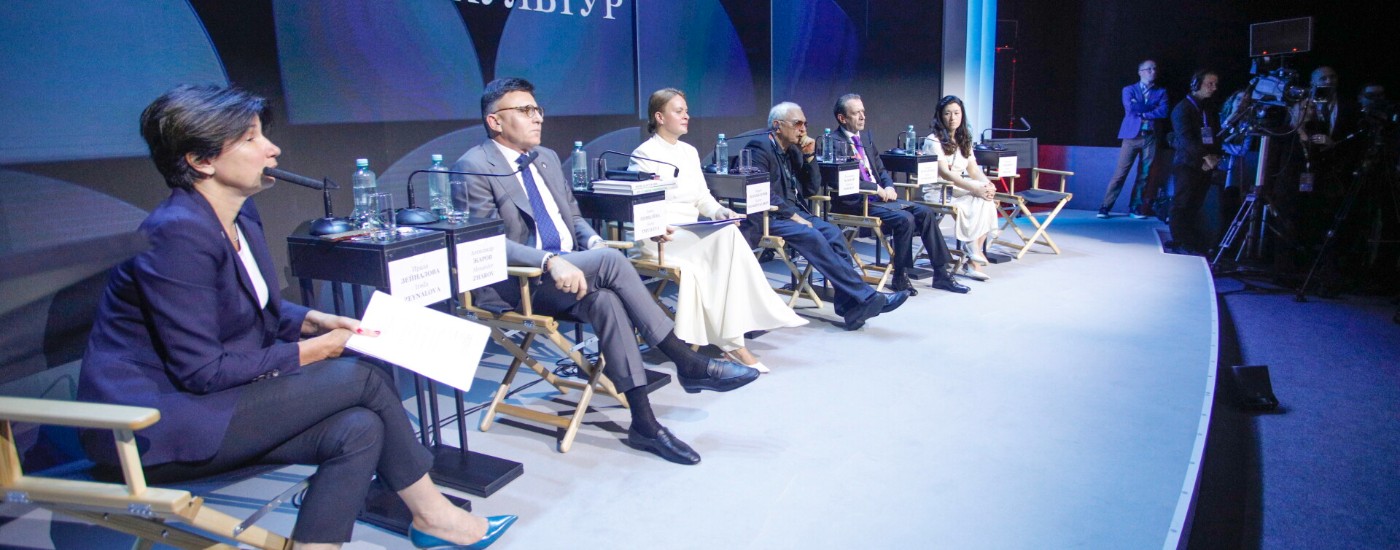At the X St. Petersburg International Forum of United Cultures, a panel discussion titled "The Modern Hero in Cinema and Media: Role and Importance for Society's Development" took place. The moderator was Irada Zeynalova, a journalist and host of the "Weekly News Digest" program on NTV. Participants discussed the processes of shaping the modern Russian cinematic hero who will continue to resonate over time rather than fade away as a temporary phenomenon.
Participating in the discussion were Alexander Zharov, General Director of Gazprom-Media Holding; Anna Civileva, State Secretary and Deputy Minister of Defense of the Russian Federation; Vladimir Mashkov, Chairman of the Union of Theater Workers, Artistic Director of the Tabakov Theater and School, Director of the Sovremennik Theater; Karen Shakhnazarov, General Director and Chairman of the Board of Mosfilm, film director, and screenwriter; Milos Bikovich, actor and producer; and Elvira Nurgalieva, Deputy Minister of the Russian Federation for the Development of the Far East and Arctic.
The panelists expressed differing views on whether it is possible to determine which type of hero the audience prefers to see on screen.
Alexander Zharov shared the results of research conducted by Gazprom-Media Holding. The study focused on changes in cinematic hero archetypes and audience preferences:
"Amid the tectonic shifts happening in the world and the positive changes occurring in our country, the Russian cinematic hero is standing taller, becoming more independent, and closer to the people. We identified 43 hero archetypes," Zharov explained.
The panelists noted that Russian viewers have increasingly favored domestic protagonists over the past decade. "The mental image and the role of heroes are changing as society changes. In the 1990s, Russian cinema was not well-loved, and the word 'patriotism' had negative connotations. Today, the situation has changed dramatically, and Russian viewers feel more connected to Russian films," Milos Bikovich pointed out.
According to Karen Shakhnazarov, filmmakers of the Perestroika era abandoned the educational role of cinema, which he sees as a significant mistake. Nevertheless, he emphasized that creating a “hero for the ages” cannot be achieved through analysis alone:
"No survey or conference will tell you how to create a hero. A popular actor or a successful film doesn’t necessarily mean that the character will become a hero for future generations. There must be an articulated idea, and for our country, that idea must be grand. It’s already maturing," Shakhnazarov emphasized.
The participants concluded that it is only possible to create a perfect cinematic hero by researching audience preferences or the current popularity of certain characters.
"The work of an actor or director in cinema is secondary. First, a screenplay must be written. The overarching goal of a person is born in the audience, which makes it difficult to capture the essence of a hero: the audience constantly evolves based on the life circumstances they face. But when you have a high-quality screenplay, a hero emerges. It’s time for documentary filmmakers and poets, and the hero is being shaped. The hero is about to appear, but only if we remain sincere," said Vladimir Mashkov.






